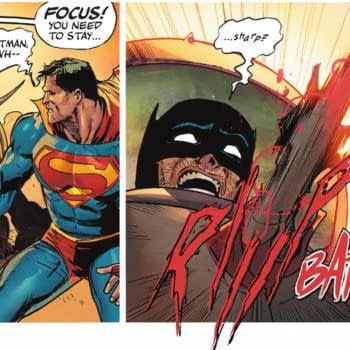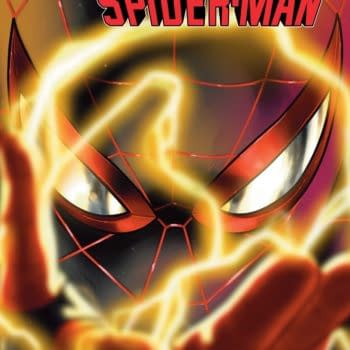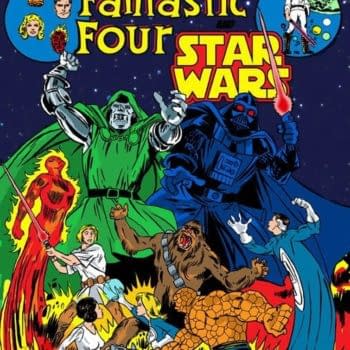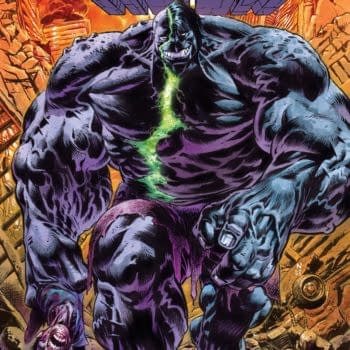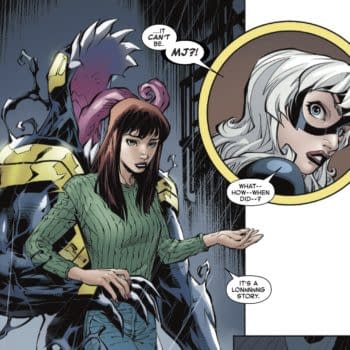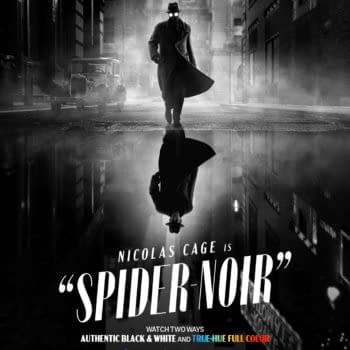Posted in: Movies, Review | Tagged: america, doctor who
Semi-Coherent by Tom Huxley #1: Squashed Easter Eggs
Tom Huxley writes for Bleeding Cool
Don't read this article unless you've seen the last three minutes of Doctor Who series 6 as reading this article would otherwise completely ruin all of it.
And indeed be sure to watch it first as nothing in this will otherwise make a lick of sense to you.

"Time can be rewritten."
"Don't you dare."
So River says to the Doctor as the automated spacesuit she's trapped inside attacks the invincible android under his control. The epic moment of River killing the Doctor, as it turns out, is little more than a battle of the exoskeletons (enacted on hideously obvious single-camera-angle green screen as presumably this scene wasn't written early enough that they could have filmed it during their American excursion at the start of the series). Well, okay, maybe a lot more, as time itself did briefly disintegrate.
So why did River have to be in that suit, as per the Silence – why couldn't it have been someone with a real grudge against the Doctor, or one of the Silence henchmen themselves, perhaps even Madame Kovarian, why did they take such a gamble to put River in there? I guess they wanted to enshrine it as a fixed point in time, in which case does killing a time lord require another time traveller with time lord modified DNA to perform the act? Or was it the multiple presences of River at that point in time that made it happen – note that not only was River at Lake Silencio twice over, but also gestating in Amy's womb at the same time, and on the other side of the planet in her previous regeneration "Mels".
I was a little surprised when I read that this episode would only run forty-five minutes long (as compared to previous finales of 50 minutes or longer, also usually forming the second part of a two-part story! Though in a sense this was the fifth part of a five part story spread across the full series), given how much it seemed there needed to be resolved; those big, grand questions. What is River to the Doctor? Why did the Doctor have to die? What is the oldest question in the universe (and what is its answer)? And, most vitally… if the Doctor survives, then how does he manage to get around the fact that we've seen him die, and that we know without a doubt that it's definitely him? Put simply, and we're only asking this not because of anything we've been shown in the show itself but because we just KNOW this perennial television series will go on forever with this character in the lead: how does the Doctor escape? This latter question, which I suppose this entire episode really dedicates itself to resolving, is only truly answered in the closing three minutes of the show.
In fact, everything felt kind of crammed together. Not what so many call "rushed". Just very tightly compressed, high in concentrate, with everything moving so fast that if you blink you may very well miss some crucial details (or at least forget them as soon as you've seen them, as though there were some memory-rewriting monsters lurking amongst the cast that I can't remember). In fact they packed so much into this episode that there were some less-than-crucial elements right in the foreground that completely escaped my attention – or is it just a testament to racial harmony that I didn't bat an eyelid at the sight of a Silurian doctor treating Emperor Churchill? It's only now that I reflect on it that I realise how profoundly weird it looked.
Among those many squashed Easter eggs were a couple of glaring in-jokes. Rory Williams, according to those "sentinels of history" we now call the Silence, is "the man who dies and dies again". Fair enough, but Amy has "died" at least as many times (and often by Rory's own hand). Granted, Rory has stayed dead longer, in terms of screentime, and his deaths have been more memorable…
Continuing this self-referential theme, Charles Dickens announces A Christmas Carol as his new Christmas special, funnily enough something the episode's writer did himself last year (or the same title and basic premise, at the very least).
I can't say I expected those final twists, though it was so obviously foreshadowed in the recap at the start of the show (a bit that I was absent for on the first viewing). I have to say the solution to the Doctor's continued existence was a brilliant, neat trick that took me completely by surprise. And so many had sussed "the question" as soon as they saw "Let's Kill Hitler", but it never occurred to me as I never imagined they'd be so bold as to suggest they might answer it to the viewer. When the Doctor said "there's only one time I could" tell anyone his name we all presumed he meant at his wedding, to River – and certainly this episode played on that – so what could he possibly have meant? (On his tax return?) Though on the strength of that former twist I feel quite inclined to rechristen him Doctor Houdini!
In fact, despite all the explanations, there's a lot that's never quite spelt out. What awaits the Doctor at the fields of Trenzalore? (Guess that's a mystery for another day. Though I'm hoping "the fall of the Eleventh" is quite a long way off, frankly.) Why did the Tardis explode at the end of the last series? (Because Amy and Rory had bunk bed sex in it? But then what was the external force that propelled the Tardis to that date? Was it the Silence? Or the Tardis itself trying to repair the paradox of River Song existing in a universe where her father was never born?) Why does River Song consent to serve time in prison for a crime she knows full well she hasn't committed? (To conserve the secret of her husband's continued existence, I suppose. I am highly intrigued by the prospect of a clandestine Doctor.)
"Time can be rewritten."
"Not those times, not one line, don't you dare!"
So the Doctor says to River as she sacrifices her life to save his, in "Forest of the Dead". As much as the last three minutes of this episode may appear to render the rest of it irrelevant, it isn't. It is River's one great romantic gesture to the Doctor. And while time may have stopped… this was one of those times.
Tom Huxley is a political activist, but not the kind you like. He is writing 750 words or more a day, some of them for Bleeding Cool.
[Brendon Connelly has managed to trap a nerve in his arm under his muscles (yes, apparently he has some) and is in rather a lot of pain. He apologises for his tardiness until either the muscles reject his nerve (and what a nerve he has) or surgeons cut it out. He is probably also trying to work out if he could film such an operation and use it in a horror film he's working on.]







